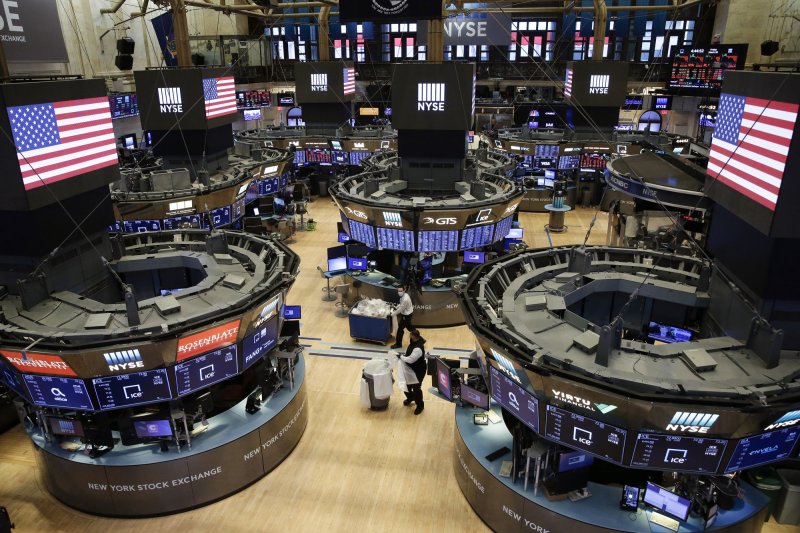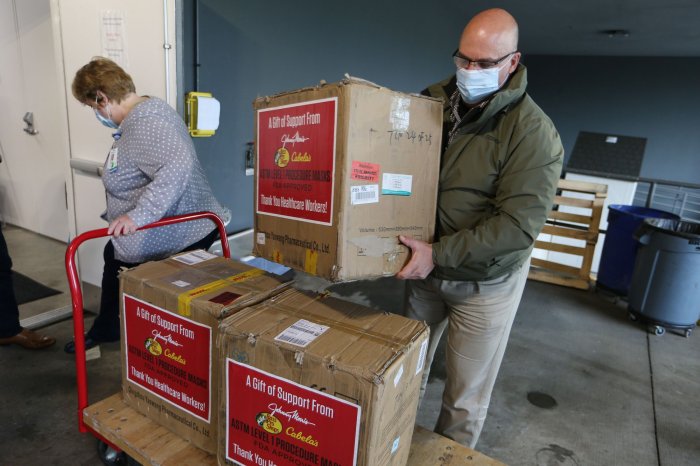Workers sweep the floor of the New York Stock Exchange on Friday after the closing bell. Monday was the first day of all-electronic trading, the first time in history the trading floor is closed while the stock market is open. Photo by John Angelillo/UPI |
License Photo
March 23 (UPI) -- The Dow Jones Industrial Average fell 582 points on Monday after a coronavirus stimulus package stalled in Congress, as the New York Stock Exchange conducted its first day of electronic-only trading due to the virus.
The Dow closed down 3.04 percent on Monday, while the S&P 500 slid 2.93 percent and the Nasdaq Composite fell 0.27 percent after Senate Democrats for a second time voted against advancing a more-than $1 trillion stimulus package aimed at helping individuals and businesses weather the economic effects of the COVID-19 outbreak.
Stocks fell despite the Federal Reserve permitting unlimited buying of Treasury bonds and mortgage-backed securities, saying "aggressive efforts" must be taken to "limit the losses to jobs and incomes.
U.S. oil prices also fell after plummeting 30 percent last week as WTI crude fell 1 percent at $22.36 and Brent crude fell 4.5 percent.
For the first time in history on Wall Street, there wasn't any waving or shouting or bustling among traders on the NYSE floor at the opening bell Monday.
Instead, things were mostly quiet as stockbrokers began their first day of electronic trading.
As a result of the global coronavirus outbreak, the exchange decided to end physical trading on the floor -- an activity that usually involves large gatherings there. Traders and managers will begin working remotely until further notice.
The closure affects two main areas in New York City and one in Northern California -- the equities trading floor and American Options trading floor in Manhattan, and the Arca Options trading floor in San Francisco.
Monday's move to telecommuting was the first time the stock exchange closed the trading floor since it began operating at its current location in 1903. The floor has closed before, during times of war and severe weather, but the stock markets themselves were also closed for business on those occasions.
NYSE President Stacey Cunningham made the decision last week to close the trading floor after two workers tested positive for the coronavirus disease.
"NYSE trading floors provide unique value to issuers and investors, but our markets are fully capable of operating in an all-electronic fashion," she said. "And we will proceed in that manner until we can reopen our trading floors to our members.
"While we are taking [this] precautionary step ... we continue to firmly believe the markets should remain open and accessible to investors. All NYSE markets will continue to operate under normal trading hours despite the closure of the trading floors."
The three major U.S. indices that trade at the NYSE have seen wild, virus-related volatility in recent weeks. The Dow Jones Industrial Average, which has been on a steady upswing for years, has erased all of the gains it's made since President Donald Trump took office -- one of the primary pillars of his re-election campaign.
The Securities and Exchange Commission published rules over the weekend to allow the NYSE to move to electronic trading.
"The nation's capital markets have functioned well as market participants have implemented their business continuity plans," it said. "NYSE will move to fully electronic trading on Monday. Normal market hours will apply."
The emergency circuit breakers that cut power to trading infrastructure, installed after the "Black Monday" crash in 1987 to halt trading if losses become too steep, will continue to operate normally, officials said.
NYSE Group Chief Operating Officer Michael Blaugrund said the market's resilience has been impressive, but operating remotely has been frustrating.
"To be in market conditions that are this extraordinary and dealing with strategic questions that are this significant and having to do it from a distance is maddening," he said.
Analyst Tim Anderson of Equity Market Strategist at TJM Investments said he expects the switch will "kill the business" of some floor brokers.
"Many portfolio managers use price and volume information they get directly from the trading floor to help 'right size' buy and sell orders," he said.
The SEC's rule changes are temporary. They will last until May 15 -- unless the floor can reopen sooner.
Amid the wild trading days on Wall Street recently, there have been some calls to close the markets. Cunningham and leaders of the Nasdaq and global markets firm CME have opposed the idea.
The move to remote trading is not related to an order Friday by New York Gov. Andrew Cuomo for all nonessential workers to remain home as a measure to prevent the spread of the coronavirus, as financial services workers are formally considered "essential" by the state of New York. Nonetheless, the reason for Cunningham's and Cuomo's decisions is the same.
"The NYSE has robust, regularly tested contingency plans in place to initiate fully electronic trading on its exchanges," the NYSE said in a statement. "However, floor broker order types will be unavailable. On the NYSE's options markets, electronic trading will continue normally but open-outcry trading will be suspended with the closure of the options trading floors.
"The decision to temporarily close the trading floors represents a precautionary step to protect the health and well-being of employees and the floor community in response to COVID-19."
Bass Pro Shops marketing manager David Smith (R) carries a box of donated face masks into Mercy Health in Chesterfield, Mo., on May 13. The company is donating 1 million FDA-approved ASTM Level 1 Procedure Face Masks to healthcare workers and first responders working on the front lines of the pandemic. Photo by Bill Greenblatt/UPI |
License Photo
















